Student Perspective
Viva Guatemala!
By Jennifer Vines
Picture three towering volcanoes encircling a small town where every home and storefront is a different color. This is Antigua, Guatemala, where I've spent the last two summers teaching medical Spanish in the Ohiyesa Language Proficiency Program. Founded and directed by Dr. Jack Lyons, a retired DMS surgeon, the Ohiyesa summer program is designed for preclinical students who want to learn Spanish and discover volunteer international health opportunities in Guatemala.
Colorful sights: The language component of the program consists of four hours of one-on-one Spanish lessons every afternoon through a local language school, Probigua. Morning activities include classes in medical Spanish; visits to local clinics and social service projects; and talks on such topics as nutrition, breast-feeding, and the state of public health in Central America. Although about half of the program's participants are from DMS, this past summer we enjoyed the company of medical students from Mt. Sinai, Boston University, Harvard, Albany College of Medicine, the University of Wisconsin, and New York University. All 12 participants lived with local families and enjoyed the indigenous open-air markets and other colorful sights and sounds of Antigua.

|
|
There were also opportunities to visit the ancient
Mayan ruins of Tikal, to go caving in the central region of
Coban, or to take in the beautiful scenery of Lake Atitlan. |
The pace of the four weeks was fairly rigorous, and much free time was dedicated to studying Spanish grammar and vocabulary. Fortunately, there were still opportunities to venture into other areas of the country—to visit the ancient Mayan ruins of Tikal, to go caving in the central region of Coban, or to take in the beautiful scenery of Lake Atitlan—travels that gave participants a feel for the geographical and cultural diversity of this small country. (Of course, trips within Central America often involve gastrointestinal complaints and crazy adventures on overcrowded "chicken buses," but what is perceived as chaos by those of us from developed countries is simply part of the reality of this fascinating culture.)
South of the border: Personable and dedicated to both students and the medically underserved, Dr. Jack Lyons (known as "Doctor Yack" to the Guatemalans, since they cannot pronounce "j" as we do) fell in love with Latin America in 1951 when he visited Mexico for the first time. After joining the Dartmouth faculty in 1959, he made the time amidst his surgical and teaching obligations for periodic travel south of the border. In 1987, he studied Spanish in Cuernavaca, Mexico, with his wife and soon after discovered beautiful Antigua as his interest in international health began to take off. Though trained in vascular surgery and intensive care, he has delivered primary care as a volunteer in Honduras, as well as at clinics near Antigua designed to aid the underserved indigenous population. Dr. Lyons is currently one of four members of the board of directors of Ohiyesa, a privately funded nonprofit organization named after a Sioux Indian who graduated from Dartmouth College and Boston University School of Medicine in the late 19th century. The goal of the Ohiyesa program is to improve students' ability to address the needs of the medically underserved and to bridge cultural barriers.
I became involved with the program four years ago, as a Dartmouth undergraduate majoring in Romance languages and aiming at medical school. I decided to combine my interests in Spanish and medicine to create a basic medical Spanish course for DMS students. After teaching a six-week pilot course during the summer after my sophomore year, I was encouraged to create an official DMS elective open to first- and second-year students for credit. With Dr. Lyons's sponsorship, I taught the class as a winter elective during my junior and senior years and then in Guatemala after I graduated. I offered the elective again (this time to fellow medical students) last winter and could not resist returning to Antigua to participate in the Ohiyesa Language Program for a second time this past summer.
Phrases: This winter will mark my last medical Spanish offering at Dartmouth before I head for my clinical training to Brown, where I intend once again to integrate my interests in medicine and language by working with the Hispanic community in Providence. It will be my chance to apply the phrases I have been drilling medical students on for three years—expressions such as ?Donde duele? (Where does it hurt?) and Todo esta bajo control (Everything is under control). With the growth in this country's Spanish-speaking population, I am sure everyone who has participated in my classes will have similar opportunities during their medical careers.
Now far away from the lush scenery of Guatemala, I am trying to keep my memories alive, with the help of my seven Ohiyesa classmates and Dr. Lyons. We are permanent fixtures in each others' scrapbooks and continue to greet each other in Spanish when we meet on campus. As medicine becomes ever more grounded in science, genetics, and technology, the time we spent in Central America last summer reminds us of the importance of humanism in medicine, helps us to remain open-minded toward human experiences that differ greatly from our own, and aids us in understanding and overcoming the cultural and linguistic barriers involved in delivering medical care.
Vines is a second-year student at Dartmouth Medical School. She grew up in Athens, Ohio, where her parents teach foreign languages at Ohio University.
